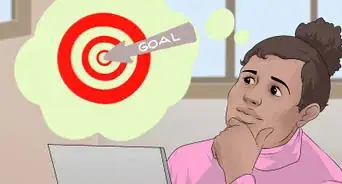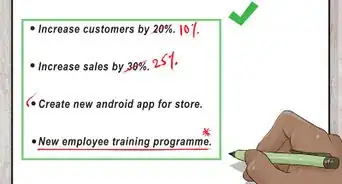This article was co-authored by Katherine Kirkinis, Ed.M., MA. Katherine Kirkinis is a Career Coach and Psychotherapist who has served as a career expert for Forbes, Medium, Best Life, and Working Mother Magazine, and as a diversity and inclusion expert for ATTN and Quartz. She specializes in working with issues of career, identity, and indecision. She has doctoral-level training in career counseling and career assessment and has worked with hundreds of clients to make career decisions through career assessments. She is pursuing a doctoral degree at The University of Albany, SUNY where her work focuses on diversity and inclusion, racism in the workplace, and racial identity. She is a published author and has been featured in academic journals as well as popular media outlets. Her research has been presented at 10+ national APA conferences since 2013.
This article has been viewed 130,754 times.
Whether you want to land your dream job or you're hoping to get better at the job you already have, a job skills development plan is a great strategy for growing professionally. Keep reading to learn how to make a plan that will help you get to the next level in your career.
Steps
-
1Outline your goals. Think about where you see yourself professionally in 3 to 5 years. Your goal may be to earn a promotion, start your own company, switch to a different career or work fewer hours. Be specific about your long-term goals, including all details about the type of job you ultimately want and the activities of your day-to-day life.[1]
-
2Assess your current situation. Determine how far you are from reaching your ultimate goal. If you want to become the manager of your own store, for example, think about the steps and skills necessary for achieving your goal. An increase in product knowledge, greater skill in employee management or stronger sales abilities are examples of necessary competencies.Advertisement
-
3Acknowledge your strengths and highly developed skills. Strong computer skills, analytical ability and marketing knowledge are examples of strengths. List all of your highly developed skills, even if you do not utilize them in your current work situation. Review your work history and recall feedback from past supervisors and co-workers to help you develop this list.
-
4Identify your weaknesses. Write down areas in need of improvement. Write them as positive statements, such as, "develop organizational skills" or "gain knowledge of XYZ software application".[2]
- Speak to your supervisor, co-workers and others who are familiar with your work habits. Ask them to identify skills that you can further develop to help you reach your professional goals.
-
5Create an action plan for developing your skills. Review your list of weaknesses and identify the areas that are critical components of achieving your long-term goals. If your goal is to manage a team, for example, and you find it difficult to deal with conflicts and stress, focus on strengthening this skill. Find an employee management class that teaches techniques in conflict resolution.[3]
- Determine if you prefer self-directed study, hands-on practice or a traditional classroom environment for developing skills.[4]
-
6Assign a timeline for the development of each skill. Be realistic. Some skills require extensive study and practice before they become strengths. Consult with your supervisor, guidance counselor, co-workers and others who may have insights about a reasonable time line for developing each skill.
-
7Check in with yourself regularly to assess your progress. Ask others whose observations you trust for feedback on your skills development progress. Stay focused on your goals by posting reminders on your calendar or on post-it notes. Display inspiring images on your desk or refrigerator, such as a picture of your ideal career life or symbols of the prosperity your new skills will bring.
Community Q&A
-
QuestionWhat is a skill development plan?
 Community AnswerA skill development plan is for achieving personal and professional growth. It is crucial for the development through utilising and analysing personal skills.
Community AnswerA skill development plan is for achieving personal and professional growth. It is crucial for the development through utilising and analysing personal skills.


































































